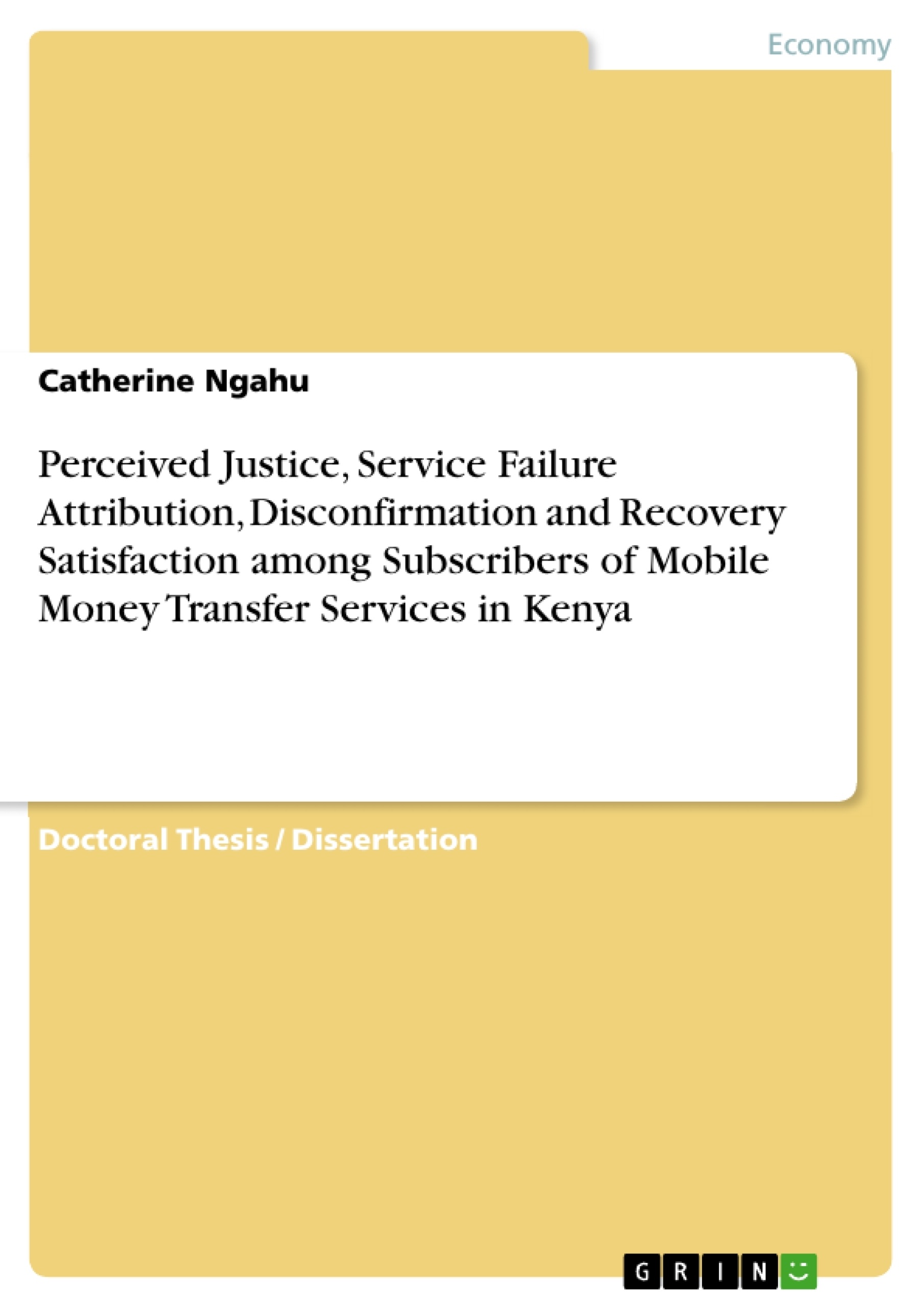The study seeks to assess the influence of perceived justice, service failure attribution, and recovery disconfirmation on recovery satisfaction among subscribers of mobile money transfer services in Kenya. The specific objectives of the study are to determine the influence of perceived justice on recovery satisfaction; assess the mediating effect of recovery disconfirmation on the relationship between perceived justice and recovery satisfaction; establish the moderating influence of service failure attribution and to determine the joint effect of the three variables on recovery satisfaction.
Customer satisfaction is crucial in maintaining a mutually beneficial relationship between service providers and their customers. While service organizations make great efforts to ensure customer satisfaction, unique features of services such as variability and intangibility make service failure inevitable. Service failure comprises any real or perceived problem that occurs during a customer’s interaction with the service provider. It may include unavailability, poor delivery, inconsistent outcomes or any incident where a service fails to meet customer expectations.
The negative disconfirmation following a service failure leads to dissatisfaction with the likely consequence of increased customer complaints, negative word-of-mouth and erosion of patronage of the service provider. Organizations strive to develop and implement service recovery strategies in order to restore satisfaction. Customers evaluate service recovery from a perspective fairness of process, interaction and outcome in line with the dimensions of perceived justice.
The population of the study comprised mobile money transfer service subscribers in Kenya. A descriptive cross-sectional survey is used. Primary data is collected using semi-structured questionnaires and a final sample of 803 respondents was realized. Reliability and validity tests are conducted using data from a pilot study. Data is analysed using descriptive statistics, factor analysis, correlation, and regression analysis. The study is relevant for regulators in setting policy for service providers with regard to service recovery standards and redress systems. The results will serve as a point of reference for service providers and managers in assessing recovery satisfaction for effective strategic marketing decision-making.
Frequently asked questions about the Mobile Money Transfer Services Language Preview
What is this document?
This document is a language preview including the title, table of contents, objectives and key themes, chapter summaries, and key words of a doctoral thesis.
What is the title of the doctoral thesis?
The title of the doctoral thesis is: "Perceived Justice, Service Failure Attribution, Disconfirmation and Recovery Satisfaction among Subscribers of Mobile Money Transfer Services in Kenya"
What does the table of contents include?
The table of contents lists the following: Acknowledgment, List of Tables, List of Figures, Abbreviations and Acronyms, Abstract, Chapters (Introduction, Literature Review, Research Methodology, Data Analysis, Interpretation and Discussion, Summary, Conclusion, Recommendations and Implications), References, and Appendices.
What is included in the Appendices?
The appendices include: Mobile Money Transfer Services Questionnaire, Hojaaji ya Huduma za Uhamishaji wa Fedha kwa Njia ya Simu, List of Mobile Money Transfer Service Providers Using MNO-LED Model, CBK Month on Month Mobile Money Transfer Statistics 2007 - 2016, Sample Size Table, Principal Component Analysis of Perceived Justice Scale (Rotated Component Matrix), Distribution of respondents by County, and Regression Results for the Mediating Effect of Recovery Disconfirmation (Steps 1-3), the Moderating Influence of Locus of Attribution on the Relationship between Perceived Justice and Recovery Satisfaction, APPENDIX 10 ... 188 The moderating influence of stability attribution on the relationship between perceived justice and recovery satisfaction ... 188, APPENDIX 11 ... 189 Regression Results for assessing the moderating influence of controllability attribution on the relationship between perceived justice and recovery satisfaction ... 189
What are the study's objectives?
While not explicitly stated in the provided snippets, the study objectives, based on the table of contents and abstract, likely include investigating the relationships between perceived justice, service failure attribution, recovery disconfirmation, and recovery satisfaction in the context of mobile money transfer services in Kenya.
What theories underpin this research?
The theoretical foundation includes Equity Theory, Attribution Theory, Expectancy Disconfirmation Theory, and Cognitive Dissonance Theory.
What are the key words associated with this research?
Key words: Perceived Justice; Service Failure attribution; Recovery Disconfirmation; Recovery satisfaction; Mobile money transfer
- Quote paper
- Catherine Ngahu (Author), 2016, Perceived Justice, Service Failure Attribution, Disconfirmation and Recovery Satisfaction among Subscribers of Mobile Money Transfer Services in Kenya, Munich, GRIN Verlag, https://www.grin.com/document/375025




